Posts by Christopher Lochhead
204 Apple’s Strategic Mastery: Unpacking the Category of Personal Intelligence | Pirates Perspective
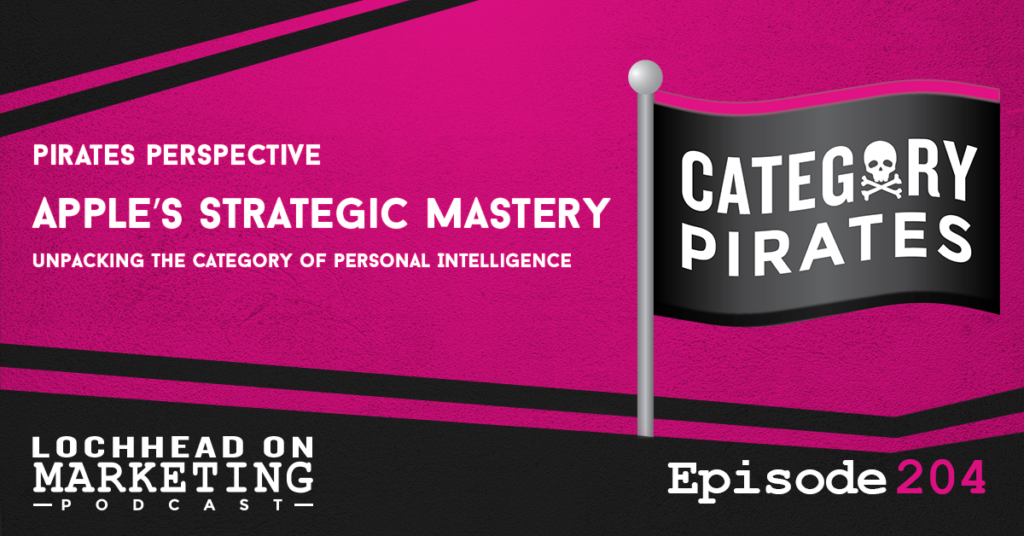
Podcast (lochheadonmarketing): Play in new window | Download (Duration: 27:03 — 18.6MB) | Embed
Subscribe: Apple Podcasts | Spotify | RSS | More
On this episode of Lochhead on Marketing, Christopher Lochhead and Eddie Yoon dissects Apple’s latest announcements from the 2024 Worldwide Developers Conference (WWDC) on an all-new Pirates Perspective.
The conversation centers around Apple’s introduction of Apple Intelligence, a cutting-edge AI-driven personal intelligence system, and their strategic partnership with OpenAI. They break down the key insights from their discussion, offering actionable advice and thorough explanations for marketers and tech enthusiasts alike.
Welcome to Lochhead on Marketing. The number one charting marketing podcast for marketers, category designers, and entrepreneurs with a different mind.
Apple Intelligence: A New Category in AI
Apple’s announcement of Apple Intelligence marks a significant milestone in the tech industry. This AI-driven personal intelligence system is designed to enhance user experiences by integrating smarter, more intuitive tools into daily lives. Christopher Lochhead praises this move, emphasizing Apple’s role as a primary category designer, particularly in the realm of personal computers.
Actionable Insights:
- Embrace Category Design: Companies should focus on creating new categories rather than just competing within existing ones. This approach can lead to market leadership and long-term success.
- Integrate AI Thoughtfully: Embedding AI in products should be done in an evolutionary manner, ensuring that it enhances user experiences without overwhelming them.
Strategic Partnership with OpenAI
Apple’s decision to partner with OpenAI rather than compete with them is a strategic move that highlights the importance of collaboration in the tech industry. Christopher Lochhead commends this approach, noting that it allows Apple to focus on serving their customers through thoughtful and aggressive innovation.
Actionable Insights:
- Leverage Partnerships: Collaborating with other industry leaders can lead to innovative solutions and a better customer experience.
- Focus on Customer Needs: Innovation should always be driven by the goal of serving customers better, rather than just outpacing competitors.
Privacy, Data Usage Concerns, and Regulations in AI
Eddie Yoon expresses both excitement and concern about the potential benefits and privacy implications of Apple’s personal intelligence system. He highlights the need for careful consideration of data usage and consumer privacy.
The conversation also delves into the need for oversight and regulations in the AI space. Christopher emphasizes the importance of strong controls while acknowledging Apple’s historical business practices and the need for critical examination.
To hear more Pirates Perspective, download and listen to this episode. You can also check out more Pirates Perspective at Category Pirates.
Don’t forget to grab a copy (or gift!) of one of our best-selling books:
Snow Leopard: How Legendary Writers Create A Category Of One
The Category Design Toolkit: Beyond Marketing: 15 Frameworks For Creating & Dominating Your Niche
A Marketer’s Guide To Category Design: How To Escape The “Better” Trap, Dam The Demand, And Launch A Lightning Strike Strategy
 The 22 Laws of Category Design: Name & Claim Your Niche, Share Your POV, And Move The World From Where It Is To Somewhere Different
The 22 Laws of Category Design: Name & Claim Your Niche, Share Your POV, And Move The World From Where It Is To Somewhere Different**NEW!** The B2B Tech Marketer’s Guide To Category Design: How To Engineer Your Market, Find What Makes You Different, And Become A Category Queen
We hope you enjoyed this episode of Lochhead on Marketing™! Christopher loves hearing from his listeners. Feel free to email him, connect on Facebook, Twitter, Instagram, and subscribe on iTunes!
363 Championing Change from Within with Congressional Candidate Tim Alexander
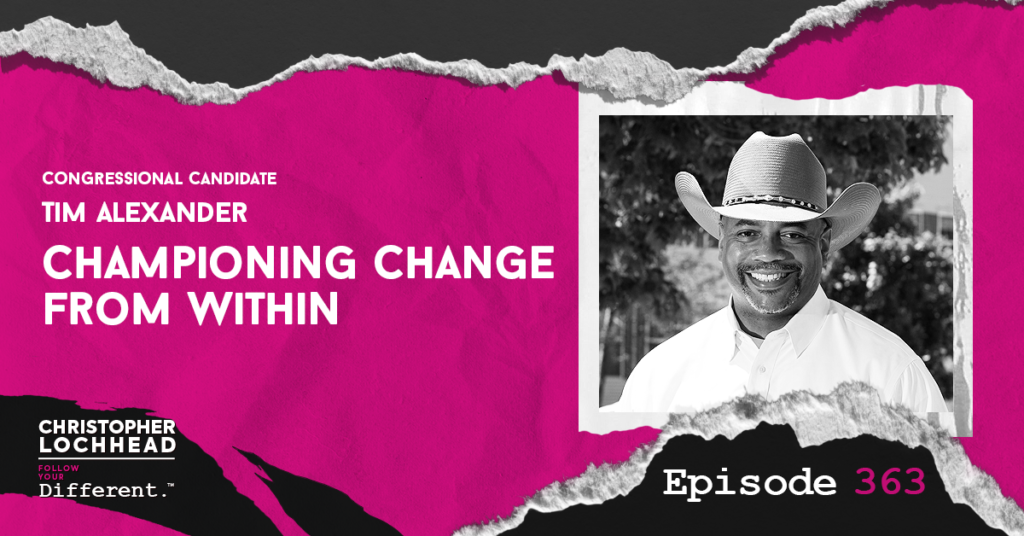
Podcast: Play in new window | Download (Duration: 1:45:17 — 72.3MB) | Embed
Subscribe: Apple Podcasts | Spotify | Pandora | RSS | More
On this episode of Christopher Lochhead: Follow Your Different, we talk with a seasoned law enforcement officer and congressional candidate, Tim Alexander.
Tim Alexander shares his inspiring journey from a challenging childhood to a distinguished career in law enforcement, driven by a pivotal encounter with police misconduct and his grandfather’s wise advice. They discuss Tim’s dedication to rewriting police policies, advocating for smarter funding and training, and his stance on gun control. Tim emphasizes his commitment to practical, moderate policies focused on public safety, affordability, and job creation, aiming to serve his community effectively.
So if you want to hear his insights on law enforcement and his plans as a congressional representative, take a seat and let’s dive right in.
You’re listening to Christopher Lochhead: Follow Your Different. We are the real dialogue podcast for people with a different mind. So get your mind in a different place, and hey ho, let’s go.
Tim Alexander’s Journey: From Adversity to Advocacy
Tim’s story is one of resilience and determination. Growing up in a poor family, he worked hard to support himself and his family. His journey took a significant turn when he decided to pursue higher education, despite financial constraints. This decision led him to an unexpected path in law enforcement, driven by a pivotal encounter with police misconduct.
Tim credits his grandfather, Doc Plummer, for inspiring him to pursue a career in law enforcement and make a difference from within. His grandfather’s advice to become a police officer to effect change from the inside was a turning point in Tim’s life.
Rewriting Police Policies: Smarter Funding and Training
One of the key themes they discussed was the true cost of policing. Tim emphasized that the cost of bringing a new officer on board goes beyond their starting salary. It includes training, equipment, and other expenses that are often overlooked.
Tim highlighted the importance of having mental health response teams to handle non-violent mental health calls. He emphasized that police officers are not always the best-equipped to handle such situations and that having trained professionals can lead to better outcomes.
Tim Alexander on Gun Control: A Balanced Approach
Tim’s stance on gun control is balanced and pragmatic. He supports the Second Amendment and the right to own guns but advocates for sensible gun laws, particularly regarding assault weapons. He emphasizes that these weapons are designed for war and have no place on the streets of America.
Tim also discussed the role of law enforcement in advocating for sensible gun laws. He expressed frustration that police associations do not take a stronger stance against assault weapons, despite the dangers they pose to officers.
To hear more from Tim Alexander and what he has done for law enforcement and his plans in the future, download and listen to this episode.
Bio
Tim Alexander, a New Jersey native, has dedicated his life to public service. After experiencing racial profiling, he pursued a 27-year career in law enforcement, rising to Detective Captain at the Atlantic County Prosecutor’s Office.
Motivated by a commitment to community trust and safety, he earned a B.S. and M.B.A. from Drexel University and a J.D. from Rutgers University. Transitioning to law, Tim worked as a Major Trials Prosecutor and in the Civil Rights Unit in Philadelphia. Now in private practice, he focuses on Civil Rights and Employment Discrimination law. Tim is a lifelong Democrat, committed to serving his community.
For more information, visit Tim Alexander for Congress.
Links
Campaign Website | X (formerly Twitter) | Facebook
We hope you enjoyed this episode of Christopher Lochhead: Follow Your Different™! Christopher loves hearing from his listeners. Feel free to email him, connect on Facebook, Twitter, Instagram, and subscribe on Apple Podcast / Spotify!
362 The Hero’s Journey: How To Make Your Customers The Heroes Of Their Own Transformational Journeys | Category Pirates
Podcast: Play in new window | Download (28.4MB) | Embed
Subscribe: Apple Podcasts | Spotify | Pandora | RSS | More
On this episode of Christopher Lochhead: Follow Your Different, we delve into the revolutionary concept of the experience economy. Coined by Joe Pine and James Gilmore in the late 1990s, the experience economy has transformed how businesses engage with customers.
This episode will break down the key insights from our conversation, offering actionable advice and thorough explanations on how to leverage the hero’s journey framework to elevate customer interactions.
You’re listening to Christopher Lochhead: Follow Your Different. We are the real dialogue podcast for people with a different mind. So get your mind in a different place, and hey ho, let’s go.
Understanding the Experience Economy
The experience economy is a concept that suggests businesses can create value by crafting memorable experiences for their customers, rather than just offering products or services. Pine and Gilmore’s visionary work has influenced modern business thinking, pushing companies to focus on the emotional and experiential aspects of customer interactions.
Key Takeaways:
- Shift from Goods to Experiences: Businesses need to move beyond selling products and services to creating immersive experiences that resonate with customers on a deeper level.
- Emotional Engagement: Experiences that evoke emotions are more likely to be remembered and valued by customers, leading to increased loyalty and advocacy.
The Hero’s Journey Framework
The hero’s journey, a narrative structure popularized by Joseph Campbell, can be a powerful tool for businesses looking to create meaningful customer experiences. This framework involves a hero (the customer) embarking on an adventure, facing challenges, and ultimately achieving transformation.
Steps of the Hero’s Journey:
- The Call to Adventure: The customer recognizes a need or desire that prompts them to seek out a solution.
- Crossing the Threshold: The customer takes the first step towards addressing their need, often by engaging with a brand or product.
- Trials and Tribulations: The customer faces challenges and obstacles, which the brand helps them overcome.
- Transformation and Reward: The customer experiences personal growth and satisfaction from overcoming challenges, leading to a deeper connection with the brand.
Making Customers the Heroes
One of the most impactful ways to engage customers is by positioning them as the heroes of their own stories. This approach not only enhances their experience but also fosters a sense of empowerment and loyalty.
Actionable Tips:
- Understand Customer Needs: Conduct thorough research to understand the desires, pain points, and aspirations of your customers.
- Craft Personalized Experiences: Use the insights gained from your research to create tailored experiences that address individual customer needs.
- Support and Guide: Act as a mentor or guide, providing the tools and support customers need to overcome their challenges.
For more insights and examples from the Category Pirates, download and listen to this episode.
Don’t forget to grab a copy (or gift!) of one of our best-selling books:
Snow Leopard: How Legendary Writers Create A Category Of One
The Category Design Toolkit: Beyond Marketing: 15 Frameworks For Creating & Dominating Your Niche
A Marketer’s Guide To Category Design: How To Escape The “Better” Trap, Dam The Demand, And Launch A Lightning Strike Strategy
 The 22 Laws of Category Design: Name & Claim Your Niche, Share Your POV, And Move The World From Where It Is To Somewhere Different
The 22 Laws of Category Design: Name & Claim Your Niche, Share Your POV, And Move The World From Where It Is To Somewhere Different**NEW!** The B2B Tech Marketer’s Guide To Category Design: How To Engineer Your Market, Find What Makes You Different, And Become A Category Queen
We hope you enjoyed this episode of Christopher Lochhead: Follow Your Different™! Christopher loves hearing from his listeners. Feel free to email him, connect on Facebook, Twitter, Instagram, and subscribe on Apple Podcast / Spotify!
361 A Tribute to Bill Walton

Podcast: Play in new window | Download (78.2MB) | Embed
Subscribe: Apple Podcasts | Spotify | Pandora | RSS | More
On this episode of Christopher Lochhead: Follow Your Different, I would like to share with you a very special tribute to a man who’s not only a legend in the world of basketball but also a cherished friend of mine—Bill Walton.
Join me as we take a walk down memory lane, revisiting the first time Bill graced my podcast with his presence and the indelible mark he’s left on my life.
A Meeting of Minds in San Diego
It was August 24th, 2017—a day etched in my memory, thanks to the friends who captured the moment and shared a photo of our first encounter. Meeting Bill Walton was like stepping into a storybook where the characters leap off the page. Here was one of the greatest NBA players of all time, a man whose stature was matched only by his extraordinary personality, ready to become a part of my world.
Our initial meeting took place at an executive event in sunny San Diego, where we were both slated to speak. I remember watching Bill, completely unscripted, captivating the audience with his life’s slideshow in the background. His ability to weave tales and engage listeners with nothing but his memories and a carousel of personal photos was nothing short of mesmerizing.

The Teacher in My Life
Bill’s journey is one of resilience. From battling a stutter to enduring chronic injuries, his path was never easy. Yet, he emerged stronger, channeling his love for music and life into everything he did. His passion was infectious, and his dedication to being unapologetically unique was something that deeply resonated with me.
Bill played a crucial role in my transition to becoming a teacher. His influence was a guiding light, helping me navigate through new territories with confidence. His life lessons extended beyond the court, and I was fortunate to be one of the many who benefited from his wisdom.

Radical Generosity and Unwavering Support
One of the most touching aspects of my friendship with Bill was experiencing his radical generosity firsthand. I’ll never forget the care package of memorabilia he sent my way—a testament to his thoughtful nature and the value he placed on our bond.
In the aftermath of a personal tragedy, it was Bill’s kindness that shone through the darkness. His heartfelt messages provided comfort and support when I needed it most, further solidifying the profound impact of our friendship.
As I reflect on the time spent with Bill Walton, I’m filled with immense gratitude. His legacy extends far beyond his basketball accolades; it’s etched in the hearts of those he’s touched with his generosity, spirit, and unwavering friendship.
I hope that this episode gives you a glimpse into the remarkable man that is Bill Walton and the special place he holds in my life. His story is one of triumph, tenacity, and the power of genuine connections. Thank you for joining me in this celebration of friendship and legacy.
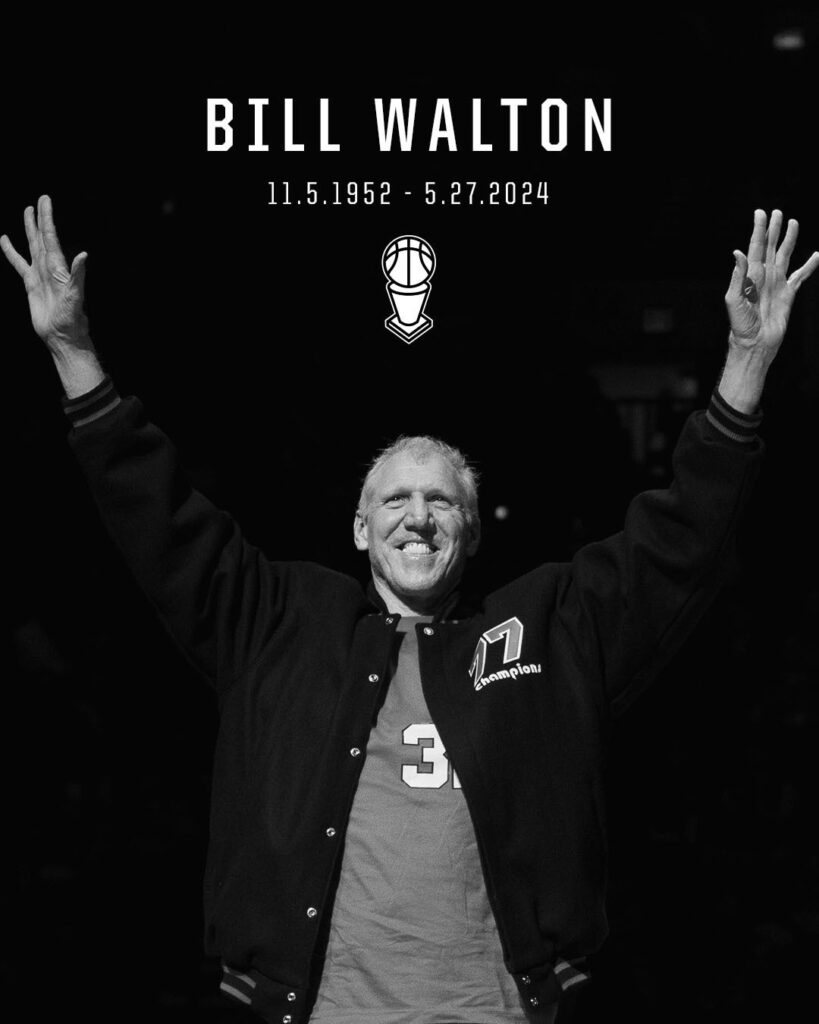
Bio
Bill Walton, an NBA legend, is renowned for his exceptional skills, dynamic personality, and influential career. Born on November 5, 1952, Walton’s basketball journey began at UCLA, where he led the Bruins to two national championships.
In the NBA, he played for the Portland Trailblazers, San Diego/Los Angeles Clippers, and Boston Celtics, earning two NBA championships and an MVP award in 1978. In 1997, Bill Walton was selected as one of the NBA’s Fifty Greatest Players of all Time.
Post-retirement, he became a beloved broadcaster, known for his colorful commentary. Walton’s legacy continues to inspire basketball enthusiasts worldwide.
Links
BillWalton.com | NBA Profile | ESPN Biography
We hope you enjoyed this episode of Christopher Lochhead: Follow Your Different™! Christopher loves hearing from his listeners. Feel free to email him, connect on Facebook, Twitter, Instagram, and subscribe on Apple Podcast / Spotify!
203 A Tribute to Bill Walton
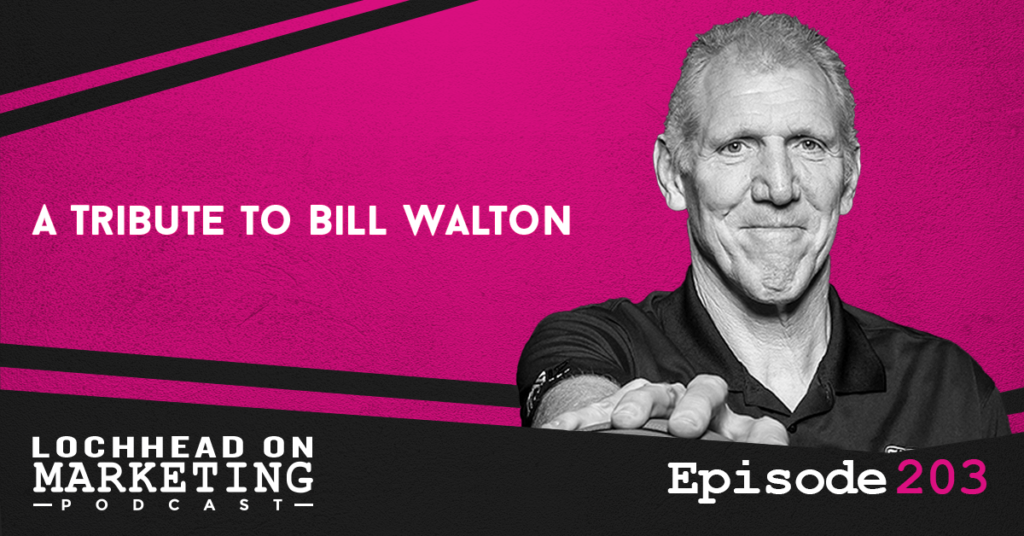
Podcast (lochheadonmarketing): Play in new window | Download (78.2MB) | Embed
Subscribe: Apple Podcasts | Spotify | RSS | More
On this episode of Lochhead on Marketing, I would like to share with you a very special tribute to a man who’s not only a legend in the world of basketball but also a cherished friend of mine—Bill Walton.
Join me as we take a walk down memory lane, revisiting the first time Bill graced my podcast with his presence and the indelible mark he’s left on my life.
A Meeting of Minds in San Diego
It was August 24th, 2017—a day etched in my memory, thanks to the friends who captured the moment and shared a photo of our first encounter. Meeting Bill Walton was like stepping into a storybook where the characters leap off the page. Here was one of the greatest NBA players of all time, a man whose stature was matched only by his extraordinary personality, ready to become a part of my world.
Our initial meeting took place at an executive event in sunny San Diego, where we were both slated to speak. I remember watching Bill, completely unscripted, captivating the audience with his life’s slideshow in the background. His ability to weave tales and engage listeners with nothing but his memories and a carousel of personal photos was nothing short of mesmerizing.

The Teacher in My Life
Bill’s journey is one of resilience. From battling a stutter to enduring chronic injuries, his path was never easy. Yet, he emerged stronger, channeling his love for music and life into everything he did. His passion was infectious, and his dedication to being unapologetically unique was something that deeply resonated with me.
Bill played a crucial role in my transition to becoming a teacher. His influence was a guiding light, helping me navigate through new territories with confidence. His life lessons extended beyond the court, and I was fortunate to be one of the many who benefited from his wisdom.

Radical Generosity and Unwavering Support
One of the most touching aspects of my friendship with Bill was experiencing his radical generosity firsthand. I’ll never forget the care package of memorabilia he sent my way—a testament to his thoughtful nature and the value he placed on our bond.
In the aftermath of a personal tragedy, it was Bill’s kindness that shone through the darkness. His heartfelt messages provided comfort and support when I needed it most, further solidifying the profound impact of our friendship.
As I reflect on the time spent with Bill Walton, I’m filled with immense gratitude. His legacy extends far beyond his basketball accolades; it’s etched in the hearts of those he’s touched with his generosity, spirit, and unwavering friendship.
I hope that this episode gives you a glimpse into the remarkable man that is Bill Walton and the special place he holds in my life. His story is one of triumph, tenacity, and the power of genuine connections. Thank you for joining me in this celebration of friendship and legacy.

Bio
Bill Walton, an NBA legend, is renowned for his exceptional skills, dynamic personality, and influential career. Born on November 5, 1952, Walton’s basketball journey began at UCLA, where he led the Bruins to two national championships.
In the NBA, he played for the Portland Trailblazers, San Diego/Los Angeles Clippers, and Boston Celtics, earning two NBA championships and an MVP award in 1978. In 1997, Bill Walton was selected as one of the NBA’s Fifty Greatest Players of all Time.
Post-retirement, he became a beloved broadcaster, known for his colorful commentary. Walton’s legacy continues to inspire basketball enthusiasts worldwide.
Links
BillWalton.com | NBA Profile | ESPN Biography
We hope you enjoyed this episode of Lochhead on Marketing™! Christopher loves hearing from his listeners. Feel free to email him, connect on Facebook, Twitter, Instagram, and subscribe on iTunes!
202 2024 Is 1939 (Again) In America
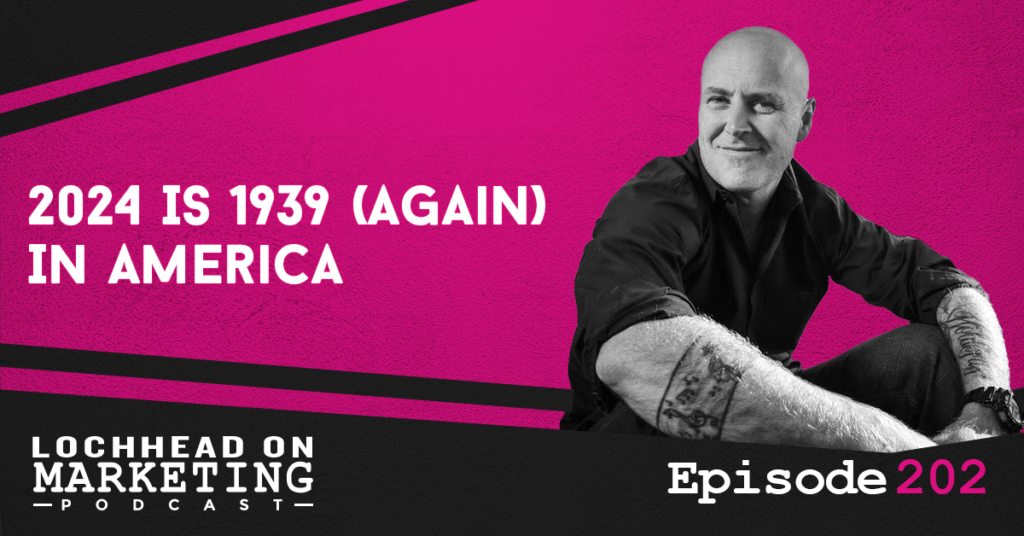
Podcast (lochheadonmarketing): Play in new window | Download (Duration: 31:46 — 21.8MB) | Embed
Subscribe: Apple Podcasts | Spotify | RSS | More
On this episode of Lochhead on Marketing, the conversation takes a deep dive into the complex and sensitive situation in Gaza, Palestine, Israel, and the broader Middle East, and how our perception here in America is being warped by misinformation from different sides.
Welcome to Lochhead on Marketing. The number one charting marketing podcast for marketers, category designers, and entrepreneurs with a different mind.
A Feeling of Déjà Vu for America
On the evening of Feb. 20, 1939, the marquee of Madison Square Garden was lit up for the big event: “Pro American Rally.” But it was the farthest thing from being American as can be. Uniformed members of pro-Hitler group The German American Bund carried American and nazi flags.
That being said, In the last week of December 1942, fifty leading German-Americans (including baseball legend Babe Ruth) signed a declaration condemning nazis which appeared in ten major American daily newspapers. Ultimately, American patriots stopped the American nazis.
Looking at the events this week at Columbia, MIT, NYU, and other elite US schools, they mirror much of the hate, horror and scale of The German American Bund. While some were there to genuinely support the civilians trapped in the ongoing conflict, there were others that openly supported Hamas’ extremist actions. It was very ironic to see banners about women and LGBT+ groups support, when they are the most oppressed in the world that these people envision.
What’s even worse is that there were reasons to suspect that these protests were sponsored by people who don’t want to get their own hands dirty.
(Mis)Information is Rampant
One of the downsides of our technological boom is the ease of access to information. Unfortunately, ease of access does not always mean a smart populace.
As information is shared from peer to peer, information gets distorted, if not outright manipulated to suit their agendas, that sometimes the victim comes out on the other end as the one being ganged on, instead of the oppressor.
This particularly true with social media sites, who has become the de-facto source of information for the younger generation. There was even a brief period where young people were lauding a speech that Bin Laden made to justify 9/11. Never mind the atrocities he and his jihadist group committed in the US and international stage, he made a great speech! Totally justified.
Call to Arms
Nazis have attacked America from within before. American patriots stopped them. The only question now is, will you and I empower radical jihadists nazis?
Or will we stop them, like our ancestors did 78 years ago?
To hear more of Christopher Lochhead’s points on the matter, download and listen to this episode.
Bio
Links
WSJ Article on the Anti-Israel Protesters
The World’s Record Holder for Executing Women Has Executed Three Women in Three Days
This Is Ahmad. He Was Queer In Palestine.
We hope you enjoyed this episode of Lochhead on Marketing™! Christopher loves hearing from his listeners. Feel free to email him, connect on Facebook, Twitter, Instagram, and subscribe on iTunes!
360 2024 Is 1939 (Again) In America
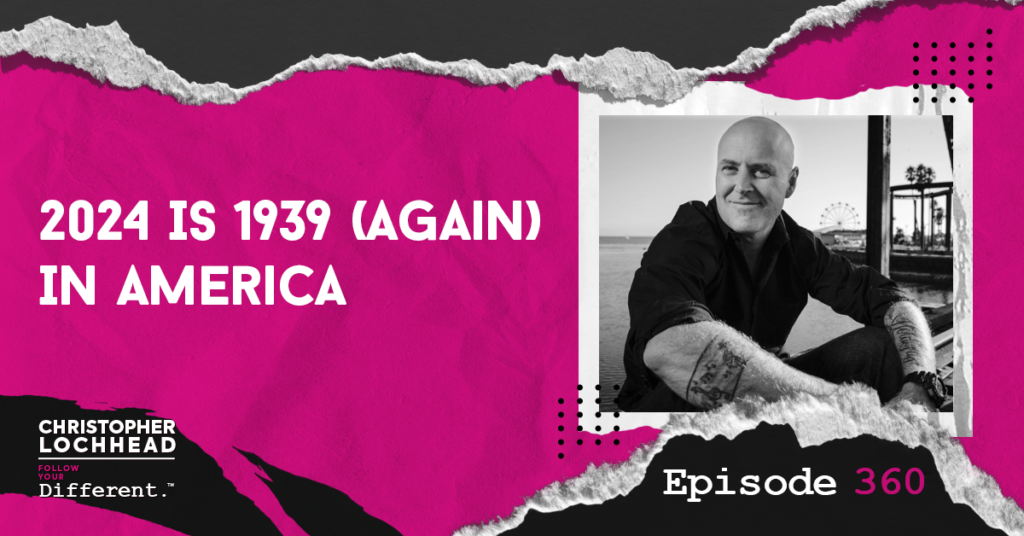
Podcast: Play in new window | Download (21.6MB) | Embed
Subscribe: Apple Podcasts | Spotify | Pandora | RSS | More
On this episode of Christopher Lochhead: Follow Your Different, the conversation takes a deep dive into the complex and sensitive situation in Gaza, Palestine, Israel, and the broader Middle East, and how our perception here in America is being warped by misinformation from different sides.
You’re listening to Christopher Lochhead: Follow Your Different. We are the real dialogue podcast for people with a different mind. So get your mind in a different place, and hey ho, let’s go.
A Feeling of Déjà Vu for America
On the evening of Feb. 20, 1939, the marquee of Madison Square Garden was lit up for the big event: “Pro American Rally.” But it was the farthest thing from being American as can be. Uniformed members of pro-Hitler group The German American Bund carried American and nazi flags.
That being said, In the last week of December 1942, fifty leading German-Americans (including baseball legend Babe Ruth) signed a declaration condemning nazis which appeared in ten major American daily newspapers. Ultimately, American patriots stopped the American nazis.
Looking at the events this week at Columbia, MIT, NYU, and other elite US schools, they mirror much of the hate, horror and scale of The German American Bund. While some were there to genuinely support the civilians trapped in the ongoing conflict, there were others that openly supported Hamas’ extremist actions. It was very ironic to see banners about women and LGBT+ groups support, when they are the most oppressed in the world that these people envision.
What’s even worse is that there were reasons to suspect that these protests were sponsored by people who don’t want to get their own hands dirty.
(Mis)Information is Rampant
One of the downsides of our technological boom is the ease of access to information. Unfortunately, ease of access does not always mean a smart populace.
As information is shared from peer to peer, information gets distorted, if not outright manipulated to suit their agendas, that sometimes the victim comes out on the other end as the one being ganged on, instead of the oppressor.
This particularly true with social media sites, who has become the de-facto source of information for the younger generation. There was even a brief period where young people were lauding a speech that Bin Laden made to justify 9/11. Never mind the atrocities he and his jihadist group committed in the US and international stage, he made a great speech! Totally justified.
Call to Arms
Nazis have attacked America from within before. American patriots stopped them. The only question now is, will you and I empower radical jihadists nazis?
Or will we stop them, like our ancestors did 78 years ago?
To hear more of Christopher Lochhead’s points on the matter, download and listen to this episode.
Bio
Links
WSJ Article on the Anti-Israel Protesters
The World’s Record Holder for Executing Women Has Executed Three Women in Three Days
This Is Ahmad. He Was Queer In Palestine.
We hope you enjoyed this episode of Christopher Lochhead: Follow Your Different™! Christopher loves hearing from his listeners. Feel free to email him, connect on Facebook, Twitter, Instagram, and subscribe on Apple Podcast / Spotify!
201 Category Creation: How To Dam The Demand
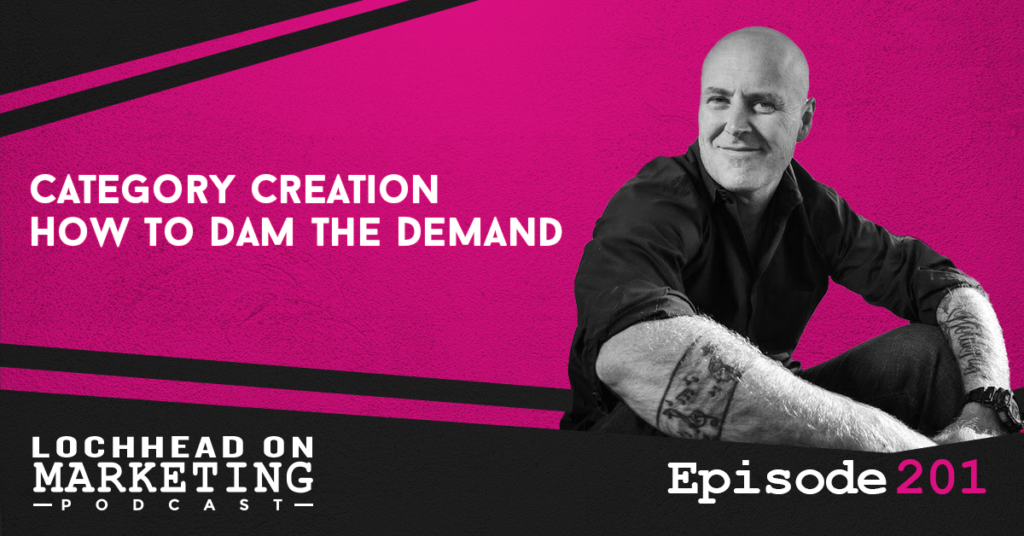
Podcast (lochheadonmarketing): Play in new window | Download (Duration: 11:42 — 8.0MB) | Embed
Subscribe: Apple Podcasts | Spotify | RSS | More
On this episode of Lochhead of Marketing, we review a powerful strategy that has the potential to revolutionize how you approach marketing and demand creation for your product or service. We call this strategy “damming the demand,” and it’s all about redirecting existing consumer desire to carve out a new category that you can dominate.
If you’re not convinced, check out how these giants in the industry have utilized this strategy to their advantage by creating demand in an already existing market.
Welcome to Lochhead on Marketing. The number one charting marketing podcast for marketers, category designers, and entrepreneurs with a different mind.
Dam the Demand
Traditional marketing often focuses on capturing the demand that already exists. It’s about finding a place in the market and filling the needs of consumers who are already looking for solutions. But what if you could do more than just meet existing demand? What if you could create a whole new category of demand?
That’s where the concept of “damming the demand” comes in. It’s a strategy that sits between traditional marketing and category design. Instead of just capturing demand or creating it from scratch, you harness the existing demand and redirect it, creating a new space for your product or service.
Lessons from Tech Titans
Let’s look at some legendary examples to understand this better. Marc Benioff, the founder of Salesforce.com, didn’t just create a cloud CRM; he dammed the demand for traditional on-premise CRM solutions. By evangelizing the benefits of cloud-based CRM, he forced a debate in the market, making businesses choose between the old on-premise solutions and the new, more flexible cloud options. This didn’t just shift the demand—it expanded it, as more and more businesses began to see the value in cloud-based applications beyond CRM.
In the B2C world, Peloton took a similar approach. They saw the demand for spin classes and dammed it by offering an alternative: high-quality home fitness. By doing so, they didn’t just capture the existing market for spin classes; they expanded it to include people who wanted the convenience of working out at home. This created a new category of home fitness solutions that has grown exponentially.
This isn’t a new phenomenon. History is rich with examples of demand damming. Consider Henry Ford, who redirected the demand from horse and buggies to the “horseless carriage,” or Marty Cooper, who shifted the demand from landline phones to the “wireless phone” category. These visionaries didn’t just create products; they created movements that changed the landscape of their respective industries.
The Strategy in Action
So, how can you apply this strategy to your business?
First, identify the existing demand that you can dam. Look for areas where consumers are already spending their money but might be open to a new, better solution. Once you’ve dammed the demand, use it to drive revenue in the near term. Then, leverage this demand to expand and create a new category that you can lead.
Damming the demand is a potent strategy for any company looking to not just compete but dominate a new market category. By redirecting existing demand, you can create a new demand for your category, driving growth and market expansion. It’s a bold move, but as we’ve seen from the likes of Salesforce and Peloton, it’s a move that can redefine your industry and cement your place in history.
Bio
Don’t forget to grab a copy (or gift!) of one of our best-selling books:
Snow Leopard: How Legendary Writers Create A Category Of One
The Category Design Toolkit: Beyond Marketing: 15 Frameworks For Creating & Dominating Your Niche
A Marketer’s Guide To Category Design: How To Escape The “Better” Trap, Dam The Demand, And Launch A Lightning Strike Strategy
 The 22 Laws of Category Design: Name & Claim Your Niche, Share Your POV, And Move The World From Where It Is To Somewhere Different
The 22 Laws of Category Design: Name & Claim Your Niche, Share Your POV, And Move The World From Where It Is To Somewhere Different**NEW!** The B2B Tech Marketer’s Guide To Category Design: How To Engineer Your Market, Find What Makes You Different, And Become A Category Queen
We hope you enjoyed this episode of Lochhead on Marketing™! Christopher loves hearing from his listeners. Feel free to email him, connect on Facebook, Twitter, Instagram, and subscribe on iTunes!
359 Life Is In The Transitions with NY Times Bestselling Author Bruce Feiler
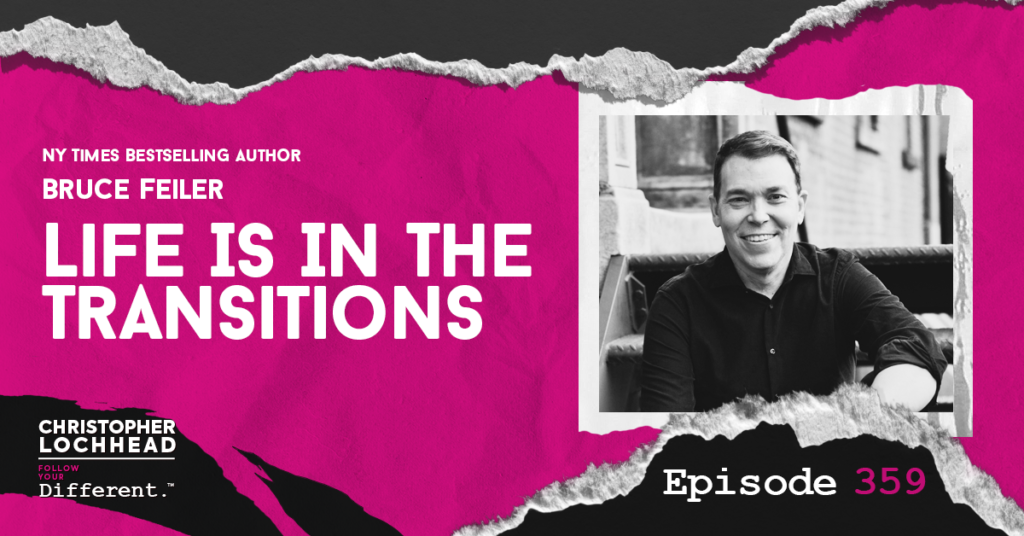
Podcast: Play in new window | Download (58.9MB) | Embed
Subscribe: Apple Podcasts | Spotify | Pandora | RSS | More
Here at Christopher Lochhead: Follow Your Different, we’ve had the privilege of engaging in conversations that transcend the ordinary, delving into the depths of what truly makes us tick. On this episode, we sat down with Bruce Feiler, an acclaimed New York Times best-selling author, to explore his work, “Life Is in the Transitions.”
Bruce Feiler is a renowned American author, television personality, and speaker known for his insightful and thought-provoking work on family dynamics, religion, and contemporary culture. He is the author of several New York Times bestsellers, including “Walking the Bible,” “The Council of Dads,” and “Life Is in the Transitions.” Feiler’s work often blends personal narrative with broader cultural analysis, and he has been a popular columnist for publications like The New York Times.
This wasn’t your typical interview; it was a real, raw conversation about the seismic shifts we all face and how we can navigate them with grace and resilience. We believe that people are now more than ever being rocked by their life quakes, and hope that Bruce’s words could help us once again.
You’re listening to Christopher Lochhead: Follow Your Different. We are the real dialogue podcast for people with a different mind. So get your mind in a different place, and hey ho, let’s go.
Bruce Feiler on the Non-Linear Journey of Life
Bruce’s personal journey is a testament to the power of embracing life’s unpredictability. From battling cancer to supporting his father through Parkinson’s disease, he’s no stranger to what he calls “life quakes.” These are the massive, often unexpected events that shake us to our core and challenge the linear narrative we’ve been sold about how life is “supposed” to go.
During our talk, Bruce recounted a moment at his 30th college reunion that sparked a revelation. As he moderated a panel of distinguished classmates, he saw firsthand the universal struggle to maintain the facade of a perfect, linear life trajectory. This experience, coupled with his own, led him to question the societal pressures that bind us to outdated life narratives.
Bruce Feiler on the Myth of the Midlife Crisis
One of the most enlightening parts of our discussion centered on the concept of the midlife crisis. Bruce debunked this myth, pointing out the flawed research and biases behind it. He argued that we need to update our understanding of life transitions to reflect the modern, non-linear world we live in—a world where change is the only constant.
We also emphasized the importance of proactive life design. We must acknowledge and navigate through life’s disruptions, which often come at us like a “car pileup,” multiple and simultaneous. It’s about learning to dance in the rain, rather than waiting for the storm to pass.
Life Quakes: Voluntary and Involuntary
Bruce explained that life quakes are frequent disruptors, with most being manageable. However, about 53% of these quakes are involuntary—like a spouse cheating or losing a job—while 47% are voluntary, such as changing religion or leaving a job. Millennials, he noted, are more inclined to seek change, while older generations may feel more stuck.
The pandemic, a collective involuntary life quake, has heightened our sensitivity to change. Bruce stressed that while the quake may be involuntary, the life transition that follows must be voluntary. It’s about taking back control and making the decision to navigate through the transition effectively.
“If we look at life transitions as periods that we have to suffer our way through, we are wasting half of our life. If we look at them as periods, they’re going to be difficult and painful, but there’s also opportunities for growth and renewal. That’s the story of your life.”
– Bruce Feiler
Bruce’s book doesn’t just lay out the problem; it offers a toolkit for navigating life transitions. He provides practical guidance on what to expect, the phases involved, and the tools to get through it. This part of our conversation was particularly impactful, as it offered listeners actionable steps to take control of their life narratives.
To hear more from Bruce Feiler and know more about life quakes and the transitions that come with it, download and listen to this episode.
Bio
Bruce Feiler is one of America’s most popular voices in contemporary life.
He is the author of several New York Times bestsellers; the presenter of two prime-time series on PBS; and the inspiration for the drama COUNCIL OF DADS on NBC.
Bruce’s two TED Talks have been viewed more than two million times. Employing a firsthand approach to his work, Bruce is known for living the experiences he writes about. His work combines timeless wisdom with timely knowledge turned into practical, positive messages that allow people to live with more meaning, passion, and joy.
His book, LIFE IS IN THE TRANSITIONS: Mastering Change at Any Age, describes his journey across America, collecting hundreds of life stories, exploring how we can navigate the growing number of life transitions with greater purpose and skill. “One of those books that’s so profoundly aligned with the zeitgeist that you end up underlining the whole book,” wrote Arianna Huffington in Thrive Global. “Bruce Feiler is the perfect person to lead us on this journey.”
Links
Connect with Bruce Feiler!
Website | LinkedIn | Twitter/X | Books
We hope you enjoyed this episode of Christopher Lochhead: Follow Your Different™! Christopher loves hearing from his listeners. Feel free to email him, connect on Facebook, Twitter, Instagram, and subscribe on Apple Podcast / Spotify!

